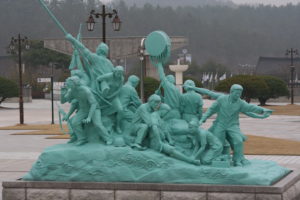Special to WorldTribune.com
 By Donald Kirk, EastAsiaIntel.com
By Donald Kirk, EastAsiaIntel.com
GWANGJU ― The ghosts of the uprising of May 18, 1980, hover over this old but new city in a restive spirit that shows the disunity, the factional splits and the regional hatreds that persist in undermining the ability of South Korea to stand effectively against challenges from North Korea.
In fact, North Korea has to be the main beneficiary of the debates about a song that Korean conservatives see as a reflection of the North’s influence over the 36th anniversary this week of the uprising in which at least 165 people were killed and 75 went missing. The song, “March for the Beloved,” would appear to be honoring the victims, but right-wingers say “the beloved” is really the late “Great Leader” Kim Il-Sung of North Korea. The proof, they say, is that the song was used in a North Korean film 25 years ago about the uprising.
Some conservatives still say that North Korea was behind the revolt that challenged the government for about ten days as students took over the city from their headquarters in the provincial building. Their leaders told foreign reporters they would die first rather than submit to the return of government control. Rightists claim that a rebel shown in one photograph manning a machine-gun was a North Korean though no one ever identified him as such.

In fact, leaders whom I saw in their headquarters two or three days before the slaughter that ended the uprising were never seen again after the army roared into town, killing or wounding hundreds who stood in the way and capturing several thousand. If there were any North Koreans, or if North Korea relayed orders, there’s never been proof. Chun Doo-Hwan, the general who was already ruling the country and made himself president three and one half months later, contrived to get Kim Dae-Jung, the wildly popular leader from the region, to stand trial for the uprising.
That claim falls apart, however, on the reality that “DJ” was already in jail when it happened. He may have been an inspiration to the rioters but could not have been in touch with them from prison.
The response to “March for the Beloved” shows how bitter if not irreconcilable are the sentiments festering so many years after those terrible days. No, the government isn’t banning it but refuses to recognize it as the official song for ceremonies on the May 18 anniversary of the outbreak of the uprising. The result is that the government staged one memorial and its foes another ― the latter with no qualms about singing the song as a show of defiance.
It’s easy to see how the words in translation stir emotions pro and con. “Let us not falter ‘til the new day comes,” one verse implores. “I will march ahead, so follow me, you that live.” That’s strong stuff.
If the song has nothing to do with North Korea, however, the North benefits from divisions sewn between the government and its critics in this city where the massacre lives on in constant reminders of the tragedy. Memories are stronger in Gwangju and in the two southwestern provinces than anywhere else in Korea.
At a songfest here on May 17, the day before the anniversary, people were singing “March for the Beloved” and other songs that show their perpetual discontent with the central government, which they say is under the thumb of leaders and bureaucrats from other regions. That was definitely true in May 1980 considering that Chun Doo-Hwan was one of a series of leaders from or near Taegu, the biggest southeastern city after the port city of Busan.
The cry during Chun’s rule was rewarded with favors denied to the cradle of dissent. Despite the slights, however, Gwangju appears to be riding a wave of construction. Glittering shopping malls and apartment blocks appear everywhere in the city while a new Asian Cultural Center looms beside and behind where the rebels had their headquarters. At nearly $1 billion, it’s a huge project, not yet finished. Luckily, the authorities have decided to preserve the old provincial building as a memorial to the revolt and to those who died.
Considering the emotions generated by “March for the Beloved,” President Park Geun-Hye should not find it so difficult to restore it to the official ceremony.
She showed her conservatism, however, when she said, yes, a choir could sing the song ― but unofficially. Although hardly a dictator like her father, Park Chung-Hee, assassinated in October 1979, six months before the uprising, she’s insensitive to sentiments here. Then again, one might ask why her enemies are kicking up such a fuss when the song is still sung legally ― it’s just not sung by everyone.
Newly anointed Workers’ Party Chairman Kim Jong-Un in Pyongyang must be pleased to see factions in the South quarreling over a song. As the furor suggests, North Korea did not have to instigate an uprising that sprang from much deeper divisions still evident today.
Donald Kirk was in Gwangju before, during and after the uprising. He’s at kirkdon4343@gmail.com.

You must be logged in to post a comment Login